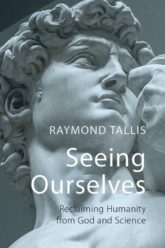
In Seeing Ourselves, humanist philosopher and neuroscientist Raymond Tallis goes in search of what kind of beings we are, and where we might find meaning in our lives. If we reject religion, asks Tallis, what should we put in its place? How do we ensure, if we accept the death of God, that something within us does not also die? And where do we find meaning if, as some scientists claim, we are simply organisms shaped by the forces of evolution, with no reason to exist and with no objective value? Tallis begins his quest by establishing what it is we know of our fundamental nature. He examines our relationship to our own bodies, to time, our selfhood and our agency – all manifestations of the unique nature of human consciousness – and shows why human beings are like nothing else in the universe. Having revealed our nature in all its glory, he then addresses what is unresolved in the human condition – our hunger for meaning and purpose – and the search for something that matches the profundity of religion. He shows that it is the actuality of human transcendence and the needs it awakens that must be the bridge across the divide between believers and non-believers. The book is ultimately a celebration. Behind the philosophical arguments is a hunger for more wakefulness inspired by a feeling of wonder and gratitude for the mystery of the most commonplace manifestations of our humanity. Tallis’s endeavour in Seeing Ourselves is to illuminate how we see our everyday world and to think more clearly about who we are. It is only when we have woken from dogmatic religion and scientistic naturalism, he argues, that we will find ourselves at the threshold of an unfettered inquiry – into ourselves, the world we have built and the universe into which we have built it – and then there may be some hope for salvation.

